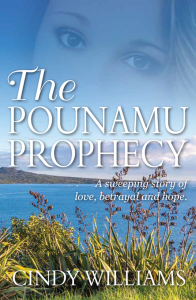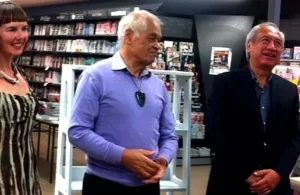Today it’s my pleasure to welcome Kiwi author Cindy Williams to the blog. Cindy recently won the 2021 Omega Writers’ CALEB Award for her novel ‘The Silk Merchant of Sychar’. Congratulations on your win, Cindy. That’s a great achievement. Can you tell us a bit about that novel and the inspiration behind it?
The Silk Merchant of Sychar

‘The Silk Merchant of Sychar’ is based on the John 4 Bible account of a woman who had five husbands and met Jesus at a well. I had no plans to write biblical fiction. I wanted to write a story based on my grandfather’s World War 1 diaries, but when I prayed to ask the Lord what I should write, the thought was clear: ‘Write about the woman at the well.’ I was not at all keen; I didn’t even like the story!
I opened the Bible and as I read the account I wondered, if she was a prostitute as I had always thought, what credibility did she have that the townspeople listened to her and walked all the way out to the well to see a stranger? That one question got me hooked.
Crafting Biblical Historical Fiction
It certainly is an interesting question. How difficult was it take a biblical story, with only a few key details, and craft it into a novel-length work? Can you share something about your research and process?
Having a story to base the novel on made it easier. It gave me an outline: marry the first, get rid of him; marry the second, get rid of him … and so on! One day I found myself at a café chatting to a friend saying, ‘I’ve figured out how to get rid of my next husband.’
I prayed a lot and scrawled notes on bits of paper and in notebooks on Leah’s character, age, family etc. I wrote character outlines for other main characters. I thought about who the five husbands might have been; and all the different scenarios in which a woman at that time, in that culture, might have been married.

I studied Roman, Jewish and Samaritan divorce laws, marriage laws, diseases at the time – all sorts of things. Because the Samaritans follow the Torah, the first five books of the Bible, I studied that too. I researched in books, Bibles and online.

Once I had a general understanding and outline of the husbands, I started to write. Then each time I got to something I didn’t know—what clothes she was wearing, what food was at the market in that month, how they spoke, the geography of the region, the archaeology of a city, the political leaders at the time—I would stop and research.
I cannot plot too far ahead. It is a scary process to sit down and have no idea what is going to happen next. Yet it is so exciting when I see the plot unfolding and random pieces dropping into place. I always have to pray before I write, otherwise I sit there with no ideas and struggle to write a few sentences. I cannot claim I wrote this book without help!
The Pounamu Prophecy
Wow, that was quite an involved process, but it’s obviously paid off in terms of authenticity. Your debut novel, ‘The Pounamu Prophecy’, was also shortlisted for a CALEB award. That’s an intriguing title. Can you explain its significance and tell us a bit about the story?
Pounamu is a special type of greenstone found only in the South Island of New Zealand. It is highly valued by Maori and often attributed with spiritual significance. The prophecy part comes from a real prophecy given by a Maori spiritual leader foretelling the coming of the British to Auckland. This original prophecy is printed at the front of the book. In the novel, I have tied the prophecy to the main characters.
The story is about how you deal with injustice and hurt, whether within a personal relationship or within a country. How do you move forward?

The main characters are two women: an Australian struggling in her marriage and a Maori woman who comes to stay with her for a few months to finish writing her memoirs. Through these we learn her history, and the true history of the Ngati Whatua tribe of Auckland. The story switches from the present in Brisbane to the past in Auckland.
Cultural Sensitivity
That sounds like a fascinating premise. I imagine some interesting issues came up when researching and writing about the different cultures. Did you have any tensions as a writer? How did you navigate that?
I grew up in a town with a high Maori population. Most of my friends were Maori – although we never thought of things like that – we were just friends. At school we learnt Maori legends and stories; at assembly we sang one verse English, one verse Maori; in the playground we played with pois or marbles or ball games or stick games. It was all normal – no separation of Maori games or Pakeha (European) games. I remember being shocked when I went to university in the South Island – it was so monocultural, as though half the world was missing.

My husband is Maori and it was a blessing that his dad is an expert in Maori history and highly regarded. Through his introduction, I was able to interview the elders at the Ngati Whatua tribe to hear their first-hand account, their childhood memories, of when the government burned down their village to ‘tidy it up’ for the Queen’s visit in 1953.
Every time I was stuck on some aspect of culture, I asked him for guidance. Both he and someone from the tribe read the manuscript to check for cultural accuracy before it was published.
Physical and Spiritual Health
That’s great that you had those contacts. It would have been fascinating to hear their first-hand accounts.
You have a Masters in Public Health and were a dietician for more than 20 years. As well as being passionate about nutrition and physical health, you’re also passionate about spiritual health. Can you share a bit about that?
I loved being a dietitian and encouraging people to live a healthy life. But over the years, I became more and more frustrated that I could not talk about all the aspects of health. I saw people eating all the right foods and doing all the exercise, yet still bound up with stress, anger and festering emotional wounds. No amount of green vegetables or gluten-free food or gym memberships would fix those!

It was the 1990s and I was being paid to speak about physical and some psychological aspects of health, but certainly not spiritual. The closest I could get to hinting that there was more to health was to quote Hippocrates’ four keys to health: food, exercise, massage and prayer.
Nowadays, the spiritual aspect of health is readily accepted, but often it has nothing to do with Jesus or the Bible. The Bible is full of wisdom about health and food. I used to do a radio program about that and maybe, one day, I will do that again.
What's Next?
What’s next on the horizon for you, Cindy?
I have written about one third of my next novel, and winning the CALEB Award has inspired me to keep working on that. It is a sort of sequel to The Silk Merchant of Sychar. It is set in a similar time and place but with different characters… although recently I’ve felt that one of my characters may be heading towards meeting Leah, despite my plans to keep her out of this story. We will see!
I am trying to write more on my author website – a mix of writing stuff, health stuff and spiritual stuff. And, after years of killing plants through neglect, I am trying to become a vegetable gardener. Perhaps that will make for some funny blog stories.
Giveaway
I’ll be happy to hear those gardening tips.
Thanks so much for joining us today, Cindy. Best of luck with your new story. It will be interesting to see how that one pans out.
Cindy has kindly made available a copy of The Silk Merchant of Sychar for one lucky reader (a print copy for Australian residents or an eBook for those in other countries). In order to be eligible, just leave a comment below by midnight on Sunday 24 October 2021. All eligible comments will go into a random draw for the prize. The winner will be contacted, and their name will also appear on this blog, on the Nola Lorraine Facebook page, and in my next newsletter. For full terms and conditions, please click here.
Author Bio

With degrees in nutrition, public health and communication Cindy Williams worked for over 25 years with sports teams, food industry and media speaking and writing about healthy eating. Now she writes a more varied diet of history, health, food and faith.
Her first novel, ‘The Pounamu Prophecy’ was a finalist in the 2016 CALEB Awards. Her latest novel, ‘The Silk Merchant of Sychar’ was a finalist in the 2020 Romance Writers of Australia ‘RUBY’ awards, and the winner of the 2021 CALEB Award for best adult novel.
After many years in Australia, she has recently returned to a sunny nook of New Zealand where she has bought pretty green gumboots, a bright red compost bin and embarked on a new project – learning how not to kill plants.
- Website: www.cindywilliamsauthor.com
- See Cindy’s author page and reviews on Goodreads.
- See a preview of The Silk Merchant of Sychar and a buy link on Amazon.


9 Responses
Oh I can’t wait to read The Silk Merchant of Sychar! I love the story of the woman at the well and how Jesus challenged her.
I laughed when I read of your coffee conversation about killing off the next husband Cindy; it’s certainly going to be an interesting read. All the best with your next novel too!
Hi Kaye – There must be lots of novelists who inadvertently alarm other people in coffee shops with their conversations. Thanks for commenting.
Hi Kaye,
Thank you for your comments. I hope you have fun reading the story!
Love, Cindy.
Congratulations on your Caleb award Cindy. What an interesting read with all the history and cultural contexts to consider. Love how you incorporate ideas from coffee conversation into your story.
Thanks for commenting, Louise. It certainly does sound like an interesting period in history.
Hi Louise,
It’s so much easier and entertaining to learn history from a novel that a textbook. I hope people will pick up some interesting history tips from this book too. It was absolutely fascinating doing the research.
Thanks for your kind comments.
Cindy.
Hi everyone – The giveaway is now closed and I’m happy to announce that the winner of our random draw is Kaye Johnson from South Australia. Congratulations, Kaye. I know you’ll enjoy the book. And thank you again to Cindy for making it available.
Wow! I’ve missed the giveaway, but I just have to hunt down your book and read it, Cindy. Cannot wait ♡
Hi Josephine – I’m sorry you missed the giveaway. I think you’ll love the book. It’s available at Koorong, as well as Amazon and other avenues. Thanks for stopping by.